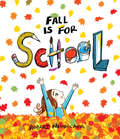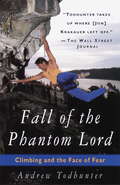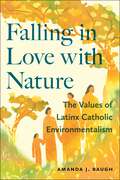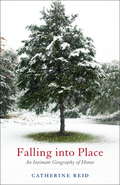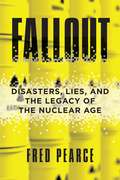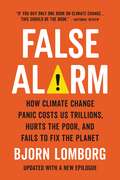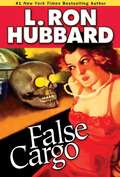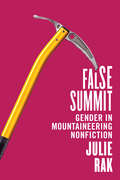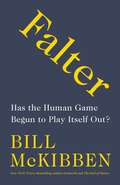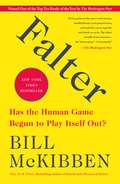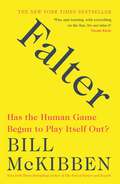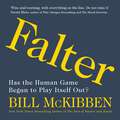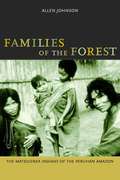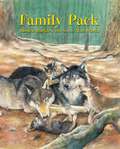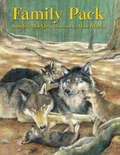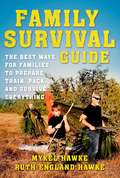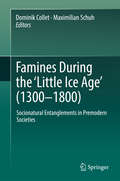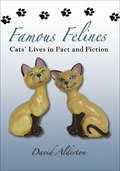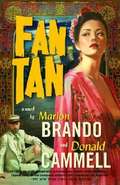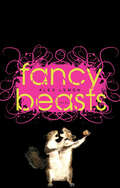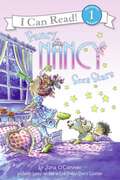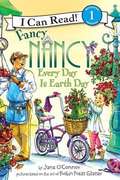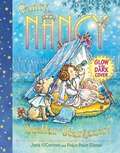- Table View
- List View
Fall Leaves (Into Reading, Read Aloud Module 3 #3)
by Elly MacKay Loretta HollandNIMAC-sourced textbook <P><P>Autumn is in the air: days grow shorter and nights are long. Birds leave, flowers, too. Apples and temperatures fall—then snow! <P><P>Part poem, part silent stage, this luminous picture book puts autumn on display and captures the spirit of change that stays with us long after fall leaves. Unlock the secrets of this busy and beautiful time of year as the natural world makes way for winter.
Fall is for School
by Robert NeubeckerFall is time for turning leaves,The weather's growing cool.Fall is here! Come on with me!It's time to go to school. In this exuberant sequel to Winter is for Snow, the two seasonally-opposed siblings face the end of summer with both joy and dread. But as Sister shares her enthusiasm for fall, school, and everything they encompass, Brother's own excitement grows in this celebratory picturebook. Robert Neubecker's expressive illustrations and buoyant rhymes will encourage even the most reluctant school-goers to embrace the start of a new season! Praise for Winter is for Snow* "Neubecker's snow-laden illustrations are crammed with activity while also revealing a certain emotional thawing." -Publishers Weekly, starred review"Neubecker's signature style and brightly colored illustrations are, as always, childcentered and detailed. A rhyming, rollicking salute to the coldest season." -Booklist
Fall of the Phantom Lord
by Andrew TodhunterIn 1989, while attempting a new route on a difficult overhanging rock face, climber Dan Osman fell. Again and again, protected by the rope, he fell. He decided then that it would not be in climbing but in falling that he would embrace his fear--bathe in it, as he says, and move beyond it. A captivating exploration of the daredevil world of rock climbing, as well as a thoughtful meditation on the role of risk and fear in the author's own life. In the tradition of the wildly popular man-versus-nature genre that has launched several bestsellers, Andrew Todhunter follows the lives of world-class climber Dan Osman and his coterie of friends as he explores the extremes of risk on the unyielding surface of the rock. Climbing sheer rock faces of hundreds or thousands of feet is more a religion than a sport, demanding dedication, patience, mental and physical strength, grace, and a kind of obsession with detail that is crucial just to survive. Its artists are modern-day ascetics who often sacrifice nine-to-five jobs, material goods, and the safety of everyday life to pit themselves and their moral resoluteness against an utterly unforgiving opponent. In the course of the two years chronicled inFall of the Phantom Lord,the author also undertakes a journey of his own as he begins to weigh the relative value of extreme sports and the risk of sudden death. By the end of the book, as he ponders joining Osman on a dangerous fall from a high bridge to feel what Osman experiences, Todhunter comes to a new understanding of risk taking and the role it has in his life, and in the lives of these climbers. Beautifully written,Fall of the Phantom Lordoffers a fascinating look at a world few people know. It will surely take its place alongsideInto Thin AirandThe Perfect Stormas a classic of adventure literature. From the Hardcover edition.
Falling in Love with Nature: The Values of Latinx Catholic Environmentalism (North American Religions)
by Amanda J. BaughExplores the contours of Latinx Catholic environmentalismHome-based conservationist measures such as cultivating backyard gardens, avoiding consumerism, and limiting waste are widespread among Spanish-speaking Catholics across the United States. Yet these home-based conservationist practices are seldom recognized as “environmental” because they are enacted by working-class immigrant communities and do not conform to the expectations of mainstream environmentalism.In Falling in Love with Nature, Amanda J. Baugh tells the story of American environmentalism through a focus on Spanish-speaking Catholics, shedding light on environmental actors who have been hidden in plain sight. While dominant narratives about environmental activism include minorities, primarily in the realm of environmental racism and injustice, Baugh demonstrates that minority communities are not merely victims of environmental problems. They can be active agents who express love for nature based on inherited family traditions and close relationships with the land. Baugh shows that Spanish-speaking Catholics have values that have been overlooked in global discourses, grassroots movements, and the highest echelons of the US Catholic Church. By drawing attention to the environmental knowledge that is already abundant within Spanish-speaking Catholic communities, Falling in Love with Nature challenges readers to rethink their assumptions about who can be an environmental leader and what counts as environmentalism.
Falling into Place
by Catherine ReidQuietly powerful essays, weaving keenly observed insights into the mysteries of nature with those of family and community "It's not easy," Catherine Reid writes, "to love a person and a place in equal measure." Love she does, however, as described in these intimate, lyric essays about the land and people around her. With the inside perspective of a native daughter combined with her outsider status as a lesbian, Reid explores such paradoxes as those that arise from harnessing wild rivers or legalizing same-sex marriage. Her fascination with natural phenomena--whether bird hibernation, the arrival of fishers in suburbia, or the explosion of amphibious life in the wet weeks of spring--is captured in writing that pays as much attention to the sounds of a sentence as to the rhythms of the landscapes she wanders. Ultimately, however, Reid finds herself having to choose between her lover and her home place. Solace comes from companions as varied as a praying mantis, an otter, and her hundred-year-old grandmother, while resilience shows up in the stories of streams recovering from toxic spills and in communities weathering floods and town meetings. In essays both sensuous and provocative, Reid faces the beauty and challenges of our changing world head-on.
Fallout: Disasters, Lies, and the Legacy of the Nuclear Age
by Fred PearceAn investigation into our complicated 7-decade-long relationship with nuclear technology, from the bomb to nuclear accidents to nuclear waste.From Hiroshima to Chernobyl, Fukushima to the growing legacy of lethal radioactive waste, humanity's struggle to conquer atomic energy is rife with secrecy, deceit, human error, blatant disregard for life, short-sighted politics, and fear. Fallout is an eye-opening odyssey through the first eight decades of this struggle and the radioactive landscapes it has left behind. We are, he finds, forever torn between technological hubris and all-too-human terror about what we have created.At first, Pearce reminds us, America loved the bomb. Las Vegas, only seventy miles from the Nevada site of some hundred atmospheric tests, crowned four Miss Atomic Bombs in 1950s. Later, communities downwind of these tests suffered high cancer rates. The fate of a group of Japanese fishermen, who suffered high radiation doses from the first hydrogen bomb test in Bikini atoll, was worse. The United States Atomic Energy Commission accused them of being Red spies and ignored requests from the doctors desperately trying to treat them.Pearce moves on to explore the closed cities of the Soviet Union, where plutonium was refined and nuclear bombs tested throughout the '50s and '60s, and where the full extent of environmental and human damage is only now coming to light. Exploring the radioactive badlands created by nuclear accidents--not only the well-known examples of Chernobyl and Fukushima, but also the little known area around Satlykovo in the Russian Ural Mountains and the Windscale fire in the UK--Pearce describes the compulsive secrecy, deviousness, and lack of accountability that have persisted even as the technology has morphed from military to civilian uses. Finally, Pearce turns to the toxic legacies of nuclear technology: the emerging dilemmas over handling its waste and decommissioning of the great radioactive structures of the nuclear age, and the fearful doublethink over the world's growing stockpiles of plutonium, the most lethal and ubiquitous product of nuclear technologies. For any reader who craves a clear-headed examination of the tangled relationship between a powerful technology and human politics, foibles, fears, and arrogance, Fallout is the definitive look at humanity's nuclear adventure.
False Alarm: How Climate Change Panic Costs Us Trillions, Hurts the Poor, and Fails to Fix the Planet
by Bjorn LomborgAn &“essential&” (Times UK) and &“meticulously researched&” (Forbes) book by &“the skeptical environmentalist&” argues that panic over climate change is causing more harm than good Hurricanes batter our coasts. Wildfires rage across the American West. Glaciers collapse in the Artic. Politicians, activists, and the media espouse a common message: climate change is destroying the planet, and we must take drastic action immediately to stop it. Children panic about their future, and adults wonder if it is even ethical to bring new life into the world. Enough, argues bestselling author Bjorn Lomborg. Climate change is real, but it's not the apocalyptic threat that we've been told it is. Projections of Earth's imminent demise are based on bad science and even worse economics. In panic, world leaders have committed to wildly expensive but largely ineffective policies that hamper growth and crowd out more pressing investments in human capital, from immunization to education. False Alarm will convince you that everything you think about climate change is wrong -- and points the way toward making the world a vastly better, if slightly warmer, place for us all.
False Cargo
by L. Ron HubbardDiscover intrigue. Brent Calloway is hired by an insurance firm to board a cargo vessel undercover and ensure it makes its way to San Diego in one piece. Once the voyage is underway, Calloway finds fraud, a pattern of organized scuttlings and the true fate of another vessel captained by an old friend. But when Calloway's true identity is revealed, he must fight for his life--and the real danger begins. ALSO INCLUDES THE ADVENTURE STORY "GROUNDED""...one of the great pulp writers, with colorful prose, lively action writing, exotic locales, fresh variations on standard characters and situations, and well-constructed plots."--Ellery Queen
False Summit: Gender in Mountaineering Nonfiction
by Julie RakThe race to climb Everest catapulted mountain climbing, with its accompanying images of conquest and sport, into the public sphere on a global scale. But as a metaphor for the pinnacle of human achievement, mountaineering remains the preserve of traditional white male heroism.False Summit unpacks gender politics in the expedition narratives and memoirs of mountaineers in the Himalayas and the Karakoram. Why are women still a minority in the world's highest places? Julie Rak proposes that the genre has itself reached a "false summit" – a peak that proves not to be the pinnacle – and that mountaineering is not ready to welcome other ways of climbing or other kinds of climbers. For more than two centuries mountaineering, as an activity and as an ideal, has helped shape how the self is understood within the context of conquest, adventure, and proximity to risk. As climbing shows signs of becoming more diverse, Rak asks why change is so hard to achieve and why gender bias and other inequities exist in climbing at all.Exploring classic and lesser-known expedition accounts from Everest, K2, and Annapurna, False Summit helps us understand why mountaineering remains one of the most important ways to articulate gender identities and politics.
Falter: Has The Human Game Begun To Play Itself Out?
by Bill McKibbenBill McKibben’s groundbreaking book The End of Nature -- issued in dozens of languages and long regarded as a classic -- was the first book to alert us to global warming. But the danger is broader than that: even as climate change shrinks the space where our civilization can exist, new technologies like artificial intelligence and robotics threaten to bleach away the variety of human experience. <p><p> Falter tells the story of these converging trends and of the ideological fervor that keeps us from bringing them under control. And then, drawing on McKibben’s experience in building 350.org, the first truly global citizens movement to combat climate change, it offers some possible ways out of the trap. We’re at a bleak moment in human history -- and we’ll either confront that bleakness or watch the civilization our forebears built slip away. <p> Falter is a powerful and sobering call to arms, to save not only our planet but also our humanity.
Falter: Has the Human Game Begun to Play Itself Out?
by Bill McKibbenThirty years ago Bill McKibben offered one of the earliest warnings about climate change. Now he broadens the warning: the entire human game, he suggests, has begun to play itself out.Bill McKibben’s groundbreaking book The End of Nature -- issued in dozens of languages and long regarded as a classic -- was the first book to alert us to global warming. But the danger is broader than that: even as climate change shrinks the space where our civilization can exist, new technologies like artificial intelligence and robotics threaten to bleach away the variety of human experience. Falter tells the story of these converging trends and of the ideological fervor that keeps us from bringing them under control. And then, drawing on McKibben’s experience in building 350.org, the first truly global citizens movement to combat climate change, it offers some possible ways out of the trap. We’re at a bleak moment in human history -- and we’ll either confront that bleakness or watch the civilization our forebears built slip away.Falter is a powerful and sobering call to arms, to save not only our planet but also our humanity.
Falter: Has the Human Game Begun to Play Itself Out?
by Bill McKibben'This is Bill McKibben at his glorious best. Wise and warning, with everything on the line. Do not miss it' Naomi Klein, author of This Changes Everything and The Shock DoctrineThirty years ago, Bill McKibben wrote The End of Nature, the first book that alerted us to the dangers of climate change. Falter is a new call to arms, to save not only our planet but our very souls as well.Over tens of thousands of years, through the harnessing of nature, the development of civilization, and the application of new technologies, human beings have created the world we live in. But as McKibben points out in this provocative and sobering look at the world today, we are fast approaching a tipping point, putting into question the viability of humanity itself.McKibben argues that we have failed to recognize how individual actions often operated against our collective interest, and as a result we now face three daunting challenges - to adjust to a new life on a broken planet, to fight the hyper-individualism that now animates government and business; and to reverse the ways that technology is bleaching out the variety of human existence. He asks if we still retain the tools and social capital to fight these larger forces - and if we are willing to make the effort.
Falter: Has the Human Game Begun to Play Itself Out?
by Bill McKibben'This is Bill McKibben at his glorious best. Wise and warning, with everything on the line. Do not miss it' Naomi Klein, author of This Changes Everything and The Shock DoctrineThirty years ago, Bill McKibben wrote The End of Nature, the first book that alerted us to the dangers of climate change. Falter is a new call to arms, to save not only our planet but our very souls as well.Over tens of thousands of years, through the harnessing of nature, the development of civilization, and the application of new technologies, human beings have created the world we live in. But as McKibben points out in this provocative and sobering look at the world today, we are fast approaching a tipping point, putting into question the viability of humanity itself.McKibben argues that we have failed to recognize how individual actions often operated against our collective interest, and as a result we now face three daunting challenges - to adjust to a new life on a broken planet, to fight the hyper-individualism that now animates government and business; and to reverse the ways that technology is bleaching out the variety of human existence. He asks if we still retain the tools and social capital to fight these larger forces - and if we are willing to make the effort.(P)2019 Macmillan Audio
Familiar Trees of North America: Eastern Region (Audubon Society Pocket Guides)
by National Audubon Society StaffTrees are our largest and most conspicuous plants, a dominant part of nearly every landscape. Learning to identify trees will not only add to your appreciation of the American countryside, but will also serve as a good introduction to other aspects of nature, since trees usually have a great influence on the kinds of birds, wildflowers, mammals, and other wildlife in an area.
Families of the Forest: The Matsigenka Indians of the Peruvian Amazon
by Allen W. JohnsonAn ethnographic account of how and why a native American people live in autonomous, self-sufficient family groups along the Amazon fringe in the foothills of the Peruvian Andes.
Family Pack
by Sandra MarkleThrough the shadows of snow-frosted trees, a young female gray wolf lopes. She is new to this place--to Yellowstone. Gray wolves haven't lived here in seventy years. This female is alone, without the comfort of her mother or other wolves. As the seasons change and the young female grows, she must learn to feed, to hunt, and to survive in her new home. She must make her own family pack.
Family Pack
by Sandra MarkleA real-life story of adaptation and survival. Acclaimed science writer Sandra Markle and celebrated artist Alan Marks team up for the fifth time in this fascinating real-life story of a wolf and her pack. Years ago, an effort had been made to eliminate wolves from Yellowstone National Park. Recently, conservationists decided to reintroduce the animal to the area, relocating wolves from Canada. Family Pack introduces readers to Female 7 and Male 2, the founders of the Leopold wolf pack—the first naturally formed pack after the relocation effort. Readers follow Female 7 as she sets out on her own upon her release to the 2.2-million-acre area that is Yellowstone. Without the comfort of her mother or other wolves, the young female grows and learns to feed, hunt, and survive in her new home. Eventually, she crosses paths with Male 2, and the wolves form a family of their own. Back matter includes more information about wolves, a bibliography, and an author’s note about the Leopold pack and the importance of reintroducing wolves to Yellowstone, restoring the natural balance.
Family Survival Guide: The Best Ways for Families to Prepare, Train, Pack, and Survive Everything
by Mykel Hawke Ruth England HawkeAre you prepared in case disaster strikes? Are your kids? In the Family Survival Guide, veteran adventurers Mykel and Ruth Hawke provide the vital information you and your family need to get through almost any disaster safely. The topics covered are wide-ranging and easy-to-follow. Here, you and your family will learn: How to find, purify, and store water How to construct different types of shelter and the perfect places to build them What to pack and what not to pack in a bugout bag Essential first aid skills How to navigate your way when lost How to build a fire Basic foraging, hunting and outdoor cooking skills And so much more! Filled with expert advice and time-tested tips, Family Survival Guide is an essential handbook
Famines During the ʻLittle Ice Ageʼ (1300-1800)
by Dominik Collet Maximilian SchuhThis highly interdisciplinary book studies historical famines as an interface of nature and culture. It will bring together researchers from the natural and social sciences as well as the humanities. With reference to recent interdisciplinary concepts (disaster studies, vulnerability studies, environmental history) it will examine, how the dominant opposition of natural and cultural factors can be overcome. Such an integrated approach includes the "archives of nature" as well as "archives of man". It challenges deterministic models of human-environment interaction and replaces them with a dynamic, historicising approach. As a result it provides a fresh perspective on the entanglement of climate and culture in past societies.
Famous Felines: Cats' Lives in Fact and Fiction
by David AldertonA delightful hiss-torical survey of cats in popular culture. Louis Wain and Beatrix Potter adored them, but Walt Disney preferred dogs; cats have been depicted in art, books and, more recently, film and TV as lovable but determined creatures. Where the dog is loving but stupid, the cat is clever but sly. Bestselling author David Alderton explores this myth and reveals just who the most famous cats are, including cartoon classics such as Top Cat, Felix, and the dastardly Si and Am from 101 Dalmatians. Using collectible memorabilia and original book covers, this charming book is a purr-fect stocking filler, along with its doggish counterpart, Famous Dogs by Fiona Shoop—ideal packaged together.
Fan-Tan
by Marlon Brando Donald CammellFan-Tan is a hugely entertaining, swashbuckling romp, from one of the greatest actors of our time: Marlon Brando. The story of an eccentric early-twentieth-century pirate who sets out on the high seas from the Philippines to Shanghai, Fan-Tan follows the exploits of Anatole "Annie" Doultry, a larger-than-life character that Brando could have easily inhabited himself. When Annie saves the life of a Chinese prisoner in a Hong Kong prison, he's led to the mysterious and seductive Madame Lai Choi San--one of the most notorious gangsters in Asia--and here the true adventures begin.Years in the making with Brando's longtime collaborator, screenwriter and director Donald Cammell, Fan-Tan is a rollicking, delectable tale--and the last surprise from an ever-surprising legend.From the Trade Paperback edition.
Fancy Beasts: Poems
by Alex LemonCalifornia wildfires, the 2008 election, plastic surgery, Larry Craig, wildfires, Wal-Mart, and rampant commercialism—in Fancy Beasts, Alex Lemon takes on American media culture, the obscene foil for personal legacies of violence and violation.The poems of this collection are a workout: vigorous and raw, frenetic and fearless. Yet they are also composed and controlled, pared down and sculpted, with a disarming narrative simplicity and directness. Even when dealing with toxic content—including the turning point in a life of abuse, in which the recovering victim/perpetrator puzzles through the paradigm of son-to-husband-to-father—Lemon&’s point of view is always genuine and trustworthy.A frank, funny, and inimitably frenetic vision of post-millennial America, Fancy Beasts is a stunning achievement from Alex Lemon.
Fancy Nancy Sees Stars (I Can Read Level 1)
by Jane O'ConnorNancy can hardly wait for her class visit to the planetarium in this Fancy Nancy story from the beloved New York Times bestselling author-illustrator team Jane O’Connor and Robin Preiss Glasser. Nancy absolutely adores stars. She loves how they sparkle in the sky, and she can even name the constellations. When she finds out her class will visit the planetarium she is ecstatic—that's a fancy word for excited. But when it starts to rain Nancy is afraid she might not be able to see the stars. Will the rain keep Nancy from watching stars sparkle?Fancy Nancy Sees Stars is a Level One I Can Read book, which means it's perfect for children learning to sound out words and sentences. The back matter features a list of the rich vocabulary words that are used throughout the story along with their definition.
Fancy Nancy: Every Day Is Earth Day (I Can Read! #Level 1)
by Jane O'ConnorBeing green is important to Nancy--so important that she wants her family to take care of the Earth morning, noon, and night!
Fancy Nancy: Stellar Stargazer! (I Can Read!)
by Jane O'Connor<P> Fancy Nancy thinks that everything in the sky is simply stellar, from the sun and the moon to the stars -and their constellations (that's 'a fancy word for the shapes that stars make!). So nothing could make her happier than a special sleepover under the stars with her dad and her little sister, JoJo. <P>Together Nancy and JoJo wish on stars, moon bathe, and even eat astronaut ice cream! But when rain clouds cover up the stars, what's a stellar stargazer to do? <P>Picture descriptions present.

